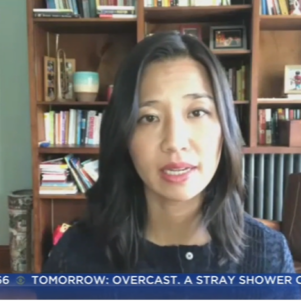California’s assisted suicide law goes into effect
By CNS News | June 10, 2016, 6:42 EDT
 Elizabeth Wallner, who is dying of colon cancer, is hugged by Dan Diaz after she spoke at a rally calling for California Gov. Jerry Brown to sign the right-to-die legislation Sept. 24 at the Capitol in Sacramento. (AP)
Elizabeth Wallner, who is dying of colon cancer, is hugged by Dan Diaz after she spoke at a rally calling for California Gov. Jerry Brown to sign the right-to-die legislation Sept. 24 at the Capitol in Sacramento. (AP) (CNSNews.com) – Beginning Thursday, a controversial law takes effect in California, which allows terminally ill patients to legally end their life with medical assistance.
The “End of Life Option Act” was signed into law last fall by Gov. Jerry Brown.
“Based on the experience with similar laws in other states, less than 1 percent of terminally ill Californians will need to utilize medical aid in dying,” Matt Whitaker, California state director for Compassion & Choices, a group that sponsored the law, said in a statement on Wednesday.
“But simply having the option gives them peace of mind that often has a palliative effect. This law is spurring open, honest conversations among California families about end-of-life care options that were not taking place before,” Whitaker added.
The assisted suicide law gained traction after 29-year-old Brittany Maynard moved to Oregon from California to end her life in November 2014. She was diagnosed with terminal brain cancer and documented her final weeks with videos posted online, where she said she should have been legally allowed to get doctor-prescribed lethal drugs to end her life in California, the Associated Press reported.
“The end-of-life option that Brittany supported will now become law in our home state of California on June 9th. This means a terminally ill individual will not have to leave home like we did and that individual can pursue this option of a gentle passing if it becomes necessary for them,” Dan Diaz, Maynard’s widowed husband, said.
Diaz advocated for the California End of Life Option Act and is now advocating for similar measures in other states.
In September 2015, the American College of Physicians sent a letter to Gov. Brown, urging him to veto the End of Life Option Act, saying it is “a physician-assisted suicide bill.”
“ACP does not support the legalization of physician-assisted suicide (PAS) and does not support PAS as an appropriate action,” they wrote. “Terms such as ‘end of life option’ and ‘aid-in-dying’ used in the bill are confusing and obscure what is at stake when physicians are asked to facilitate suicide.
“We are deeply sympathetic to the concerns and fears patients and their families have at the end of life. However, PAS is not the answer and in fact, ACP sees it as abandonment of the dying patient. It is not the role of the physician to give individuals control over the cause and timing of death—the medicalization of suicide,” the ACP added.
“The physician must always act in the best interests of the patient as healer, comforter and trusted advisor. PAS undermines trust in patient-physician relationships and trust in the profession of medicine. Proponents of PAS claim it is an act of compassion in keeping with the physician’s role as comforter. However, this argument incorrectly assumes that physicians can only provide comfort for certain patients through facilitating suicide,” ACP stated.
“In fact, physicians can and do provide comfort to dying patients. It is a lack of awareness of these services and a perceived concern that patients will not have access to this care that helps drive interest in PAS as an option. We need to ensure that all patients have access to palliative care and hospice services at the end of life rather than promote suicide,” ACP wrote.
“An individual seeking to obtain a prescription for an aid-in-dying drug pursuant to this part shall submit two oral requests, a minimum of 15 days apart, and a written request to his or her attending physician,” according to the law.
“Before prescribing an aid-in-dying drug, the attending physician” must make sure the patient has the capacity to make medical decisions, and if there are indications of a mental disorder, the physician must refer the patient for a mental health specialist assessment.
“No aid-in-dying drugs shall be prescribed until the mental health specialist determines that the individual has the capacity to make medical decisions and is not suffering from impaired judgment due to a mental disorder,” the law stated.
The doctor must also confirm that the patient’s request is not due to “coercion or undue influence by another person by discussing with the qualified individual, outside of the presence of any other persons, except for an interpreter as required pursuant to this part, whether or not the qualified individual is feeling coerced or unduly influenced by another person.”
“This bill would provide a person, except as provided, immunity from civil or criminal liability solely because the person was present when the qualified individual self-administered the drug, or the person assisted the qualified individual by preparing the aid-in-dying drug so long as the person did not assist with the ingestion of the drug, and would specify that the immunities and prohibitions on sanctions of a health care provider are solely reserved for conduct of a health care provider provided for by the bill,” it stated.
— Written by Melanie Hunter











